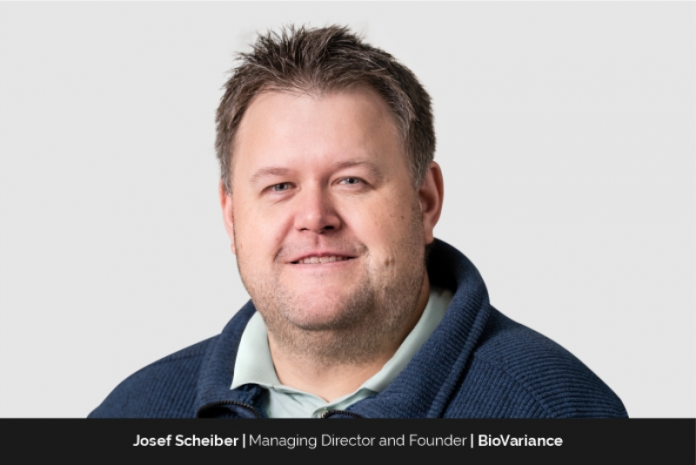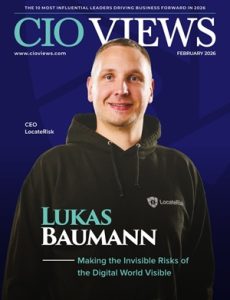Josef Scheiber is the Managing Director and Founder of BioVariance GmbH, a company focused on biomedical data analysis and related software development in the area of precision medicine.
Josef has been working in the AI field even before it became a catchall term for a wide range of applications and things. His success in this field can be credited to his grit, stubbornness, and pertinacity. If he is convinced that something is right, he is not going to stop even if someone is pushing against that.
“You need to be able to push things through and stand for your opinion,” Josef says. “It can be perceived as stubbornness both in personal and corporate life, but you need that to really achieve things.”
He has been stubborn enough to stay on track, flexible enough to adjust to changing needs, and follows through with persistence and vision that is not easy to achieve. And that is why he has been able to successfully build BioVariance from scratch.
“OUR MISSION IS TO IMPROVING THE HEALTH AND QUALITY OF LIFE OF PATIENTS USING THE ANALYSIS AND INTERPRETATION OF MEDICAL DATA.”
Stepping On to the AI Field
Josef stepped on to the AI field about two decades ago. It was when he started his Ph.D. in data analysis in pharma – predicting which small compounds can bind protein targets. And he leveraged algorithms and machine learning for that. Following that, he joined the pharma industry and worked in the U.S. and Switzerland, which led him to gain experience in how to apply those methods that he had learned to a specific scientific niche and on a broader scale.
Even when it became clear that data analysis would become a critical factor in multiple fields, no one was calling that AI. “I’m quite well cited in the AI field, but I have never actually used the word artificial intelligence in publications,” Josef points out. It is because they were published when the term AI was not used so widely.
Josef also says that now they have way better data and way better computers to Analyze a huge amount of data. For example, if one looks at approaches like ChatGPT, they have been there for a very long time, but there was no data and computational power. Now, they are equipped with both. “So, it is natural to develop into that area and grow with that field,” Josef says.
Founding BioVariance and Challenges
Josef had an idea when he was working for a major pharmaceutical company. “Life in a big pharma is good, but it requires you to work on something for a very long,” he points out. “I’m someone who gets easily bored.”
And Josef had always wanted to start his own company. Almost ten years ago, when the time was just right, he decided to step out of the corporate shop, which was making him fly around all the time, and start his own shop.
Josef says that he took the plunge into entrepreneurship because of his curiosity to do something useful and be flexible enough to bring organization into the way of doing it. In big pharma companies, it can take forever to accomplish something, and one has to run through multiple approvals. Now, as the Managing Director, he has the power to make all the decisions.
“But I also have to suffer if decisions turn out bad,” Josef says with a smile. “Good decisions have to outweigh the bad ones – and that is how this works. And every error that you make also falls back on you, but you can also leverage that as an experience.”
When he started his company, it was a one-man-shop to do data analysis for pharmaceutical companies. Now, they are doing complex biomedical diagnostics, and they now have over 30 scientists and data scientists who do complex work in the area. Josef also says that during the pandemic, they added capabilities to run their own labs, and combined both lab and data analysis work, which is their strength.
As a founder, Josef’s journey has not always been smooth. He has experienced both ups and downs. However, he believes that running one’s own company offers a deeper learning curve compared to doing a program at a university, or Ph.D., or working in a big company. Over the years, he has also learned to pivot and be flexible enough to adapt to the actual needs.
It is not possible to know what to expect – even after planning as much as one wants, according to Josef. Coming from a scientific background, he found the bureaucratic requirements and financial planning challenging. “You get a grasp of them with time, but in the beginning, one underestimates the efforts that are needed for that,” Josef points out.
At the pharma company, he had people’s responsibilities. But, as the Founder, he became responsible for everything at the workplace, which is a different ball game. “You need to grow and gain your experience there quite a bit,” Josef says.
Changing Landscape of the AI Industry
There was no AI industry per se 20 years ago, Josef points out. In 2003, when he started his Ph.D., there was no Facebook, YouTube was just launched, and Google was there. And, in the biomedical field, the discussion was – where do we get data from? There was not enough data available.
The turning point came around 2008-2009 when a huge amount of data became readily available for a price – that no one had ever dreamed of, according to Josef. There was a change from: “we don’t have enough data to we are drowning in data and what should we do.” Now, for example, molecular data can be generated from huge amounts of people in real-time. And there is much more data that has to come.
Over the years, the economic part has also grown immensely. With big players investing a significant amount in the area and providing training to people, it is a completely different field from what it was 15-20 years ago, according to Josef. “But the most impact is yet to come. It is not yet there.”
Dealing with Competition
In recent years, specially after the pandemic, competition has increased in the AI space. In order to stand out from the competitors, one needs to be an expert in specific niches, according to Josef. A completely novel method cannot be invented, as universities are involved in developing ideas and big applications are being developed by big players.
So, Josef says that one has to understand data and knowledge in a specific niche very well and applied algorithms in this area, which is personalized medicine. It includes genetic data, proteomic data, and metabolomics data. These are data related to patients that nobody would normally be looking for in search engines but are highly relevant to an individual’s health. “It is possible to Analyze that in the context of what is known from the medical literature and studies, and then you can bring all these together – all these wealth of knowledge that has been accumulated for over 100 years – basically with data that can now, thanks to other technological developments in the diagnostics area, be measured for every single patient,” Josef explains.
Earlier, it was not feasible to sequence the genome of a senior person much of the time. Now, according to Josef, it is possible to do that as well as interpret and monitor every genetic change. “Actually, the speed in the biological industry is significantly higher than in the AI industry,” he adds. “So, in the data generation, we are clearly outpacing the AI.”
But, with that speed, the medical industry also delivers a huge amount of interesting data for AI to interpret in the future. It is because more data will be easily available on human and animal biology, says Josef. And to understand that particular interface of what happens in humans and then further focus on how that affects changes in human biology, there are algorithms for that.
There is also a specific niche, where there is hardly any competition left, Josef says, adding that there is, however, a huge gap in medical need that affect many people. “So, the specialization in terms of data Analyzing and understanding that kind of data is definitely something one can be quite easily ahead of the competition because you need to bring in competencies in a totally different area,” he says.
Definition of Success
Josef finds it difficult to define success as, according to him, multiple aspects play into that. He taps into the Japanese concept called Ikigai, which means “a reason for being,” to come up with a definition.
“Success is something that you are good at, have fun doing it, it is useful for many people, and you are getting paid for that,” Josef says. “And it can be called a success if your ideas impact many people.”
He also points out that the combination of AI and personalized medicine is definitely an area where that type of success is possible.
Role and Responsibilities.
Josef enjoys scientific work, but as the Managing Director of BioVariance, he hardly does it. A major part of his workday is dedicated to meetings and coordination with team members either in person or online and talking with customers. He is actively involved in strategic discussions and planning.
“It is basically coordinating with all the different partners, connecting the right dots, making the right decisions – hoping they work out – and also being involved in public relations,” Josef says about his responsibilities. He oversees all kinds of activities that are supposed to make the company successful.
Josef also likes to look into recent developments. He is attending a program at the Harvard Medical School, and he flies to the U.S. a couple of times to get a deeper understanding of the economic aspects, where the technology is set to go, which helps in determining what needs to be done in terms of product development.
Josef also leverages the mistakes and experiences made in the previous years to be able to develop and grow even further. The kind of work he and his team do cannot be completed in a few night sessions, it takes a while to have everything in place. But they do not need something special to keep themselves motivated.
They are a highly motivated group of people because the area that they are working in matters for patients. If they get an analysis right, people who suffer from diseases profit from that.
“We use modern technology to improve the lives of patients,” Josef says. “We focus on what can help individuals to have a better life. This keeps everyone motivated.”
And, as he loves what he does, Josef does not find it tough to maintain a work-life balance. It helps him integrate his work responsibilities with his private life. “I’m not obligated to do things, but I genuinely want to do them,” he says.
When he is working, Josef feels like he is on a playground, playing with science and technology. “When you do things that matter, you also find the time for family and friends,” he says.
Good Leadership
Leaders, according to Josef, enable other people to achieve more than what they could have achieved if they were doing things on their own. And they ensure that everyone has fun doing even the most stressful things. Josef, too, is never stressed about anything.
And Josef also explains that leadership is not about being a dictator and controlling every single piece but rather enabling other people and ensuring that they are in a position to perform their best, and to remove the hurdles and problems that might be there.
A good leader can deliver “truly astonishing” results and make everyone else also do that by bringing in and integrating different expertise.
Plans for the Future
Josef points out that they have ambitions to grow the company significantly. They have started some programs, and if one of those bears fruits, that will lead to growth both in terms of employees and revenue.
And they have set long-term goals to achieve their ambitions. Josef intends to lead and contribute to reaching that process over a longer term.
Josef also wants to impact other companies and start other companies. He points out there are currently many opportunities, and the medical world may be interesting, but it is a slow-turning and highly regulated field. “So, we will try to leverage the experience in a parallel organization in less regulated areas,” says Josef. “The opportunities are endless that are coming with smart applications of AI and data analytics.”
And, for now, Josef and his team want to focus on the European market. They, however, have plans to develop a product with a partner who has a global network of mental health markers. Josef says that they definitely want to expand their footprint beyond Europe, but not in a year. It is part of their five-year plan.
Still, a Long Way to Go!
Josef is proud of his achievements, but he is not someone who likes to rest on his laurels. He continues to be ambitious and has plenty of new ideas. So, he is not yet ready to say that he has achieved everything that he had dreamed of. “There is still a long way to go,” Josef says. “One can achieve more things, and it would be boring to stop now.”
Message to Aspiring Leaders
“Do it and don’t be afraid of making mistakes,” says Josef in his message to aspiring business leaders. “Don’t be afraid of annoying other people.” He also encourages them to ask for help. “You will get the help that you didn’t expect to get,” he adds.
Josef also stresses the importance of networking in his message. “Be in contact with relevant people,” he says.
And, once aspiring leaders have decided to do something, they should just get into it, as they would figure it out on the way, according to Josef. He is of the opinion that it is best not to think much as it is not possible to think about every scenario. “You will be able to figure it out on the way,” Josef says.





